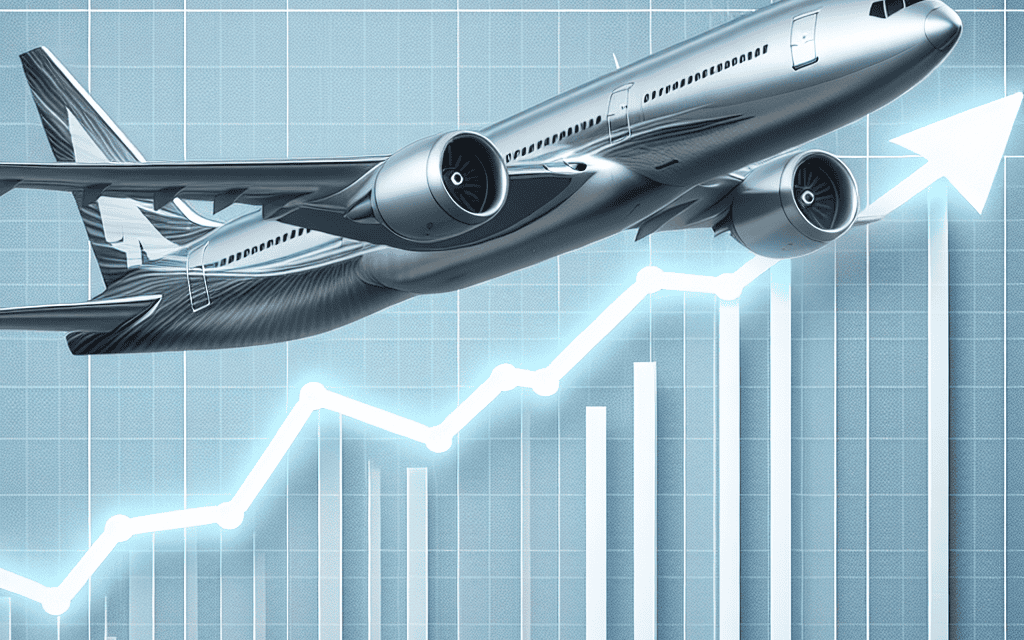“Investing in Talent: Boeing’s Bold Move to Boost Workforce Wages by $1 Billion”
Introduction
Boeing’s latest contract proposal to its workforce has the potential to significantly impact the company’s financial landscape, with projections indicating an addition of $1 billion to wage costs over the next four years. This development comes as Boeing seeks to navigate the complexities of labor negotiations while maintaining its competitive edge in the aerospace industry. The proposed offer, which includes wage increases and enhanced benefits, reflects Boeing’s commitment to investing in its employees amid a challenging economic environment. As the company balances these increased labor costs with its strategic goals, the implications of this proposal will be closely watched by industry analysts and stakeholders alike.
Impact of Boeing’s Latest Offer on Employee Compensation
Boeing’s latest offer to its workforce has sparked significant discussions regarding its potential impact on employee compensation, particularly in terms of wage costs. The aerospace giant, known for its pivotal role in the global aviation industry, has proposed a package that could see an increase of approximately $1 billion in wage costs over the next four years. This development comes at a time when the company is navigating a complex landscape of economic recovery, competitive pressures, and workforce expectations.
The proposed offer is part of ongoing negotiations with labor unions representing Boeing’s employees. These discussions are crucial, as they aim to address the concerns of the workforce while ensuring the company’s financial stability and competitive edge. The offer includes a combination of wage increases, bonuses, and enhanced benefits, reflecting Boeing’s commitment to investing in its employees. However, the potential $1 billion increase in wage costs raises questions about the broader implications for the company’s financial health and strategic priorities.
To understand the significance of this offer, it is essential to consider the context in which it has been made. Boeing, like many other companies in the aviation sector, has faced significant challenges in recent years. The COVID-19 pandemic severely impacted air travel, leading to reduced demand for new aircraft and financial strain on airlines. As a result, Boeing had to implement cost-cutting measures, including workforce reductions and production adjustments. In this context, the latest offer represents a shift towards rebuilding and strengthening the company’s human capital.
Moreover, the offer is indicative of the broader trends in the labor market, where employees are increasingly seeking better compensation and working conditions. The pandemic has reshaped workers’ expectations, leading to a heightened focus on job security, wages, and benefits. Boeing’s proposal can be seen as a response to these evolving expectations, aiming to attract and retain skilled talent in a competitive market. By offering a comprehensive compensation package, Boeing hopes to enhance employee satisfaction and productivity, which are critical for the company’s long-term success.
However, the financial implications of this offer cannot be overlooked. A $1 billion increase in wage costs over four years is a substantial commitment, and it raises questions about how Boeing plans to balance this with its other financial obligations. The company must ensure that it can sustain this level of expenditure without compromising its investment in innovation, research, and development. Additionally, Boeing must consider the potential impact on its pricing strategies and competitiveness in the global market.
In conclusion, Boeing’s latest offer to its employees is a significant development with far-reaching implications for employee compensation and the company’s financial strategy. While it reflects a positive step towards addressing workforce expectations and enhancing employee satisfaction, it also presents challenges in terms of managing increased wage costs. As Boeing navigates this complex landscape, it will be crucial for the company to strike a balance between investing in its workforce and maintaining its financial health. The outcome of these negotiations will not only affect Boeing’s employees but also have broader implications for the company’s position in the global aviation industry.
Analyzing the Financial Implications of Boeing’s Wage Increase
Boeing’s recent proposal to increase wages for its workforce has sparked significant discussion regarding the financial implications for the aerospace giant. The offer, which could potentially add $1 billion to the company’s wage costs over the next four years, reflects Boeing’s commitment to maintaining a competitive edge in attracting and retaining skilled labor. However, this decision also raises questions about how the company plans to balance these increased expenses with its broader financial strategy.
To begin with, the proposed wage increase is a strategic move by Boeing to address the growing demand for skilled workers in the aerospace industry. As the sector continues to recover from the disruptions caused by the COVID-19 pandemic, companies are vying for top talent to ensure they can meet production targets and innovate effectively. By offering higher wages, Boeing aims to position itself as an employer of choice, thereby securing the expertise necessary to drive its ambitious projects forward. This approach is particularly crucial as the company seeks to ramp up production of its commercial aircraft and expand its defense and space operations.
Nevertheless, the financial implications of this wage increase cannot be overlooked. Adding $1 billion to wage costs over four years represents a significant investment, and Boeing must carefully consider how to offset these expenses. One potential avenue is through increased operational efficiency. By streamlining processes and adopting advanced technologies, Boeing could reduce production costs and improve profit margins. This would not only help absorb the additional wage expenses but also enhance the company’s overall competitiveness in the market.
Moreover, Boeing’s decision to increase wages comes at a time when the company is still navigating the financial challenges posed by the 737 MAX crisis and the broader impact of the pandemic. The grounding of the 737 MAX fleet and subsequent production halts resulted in substantial financial losses, and while the company has made strides in recovering, it remains imperative for Boeing to maintain a delicate balance between investing in its workforce and ensuring financial stability. Consequently, the company may need to explore other cost-saving measures or revenue-generating opportunities to support the wage increase without compromising its financial health.
In addition to internal strategies, Boeing’s wage proposal could also have broader implications for the aerospace industry. As one of the leading players in the sector, Boeing’s actions often set a precedent for other companies. Should Boeing successfully implement the wage increase while maintaining financial stability, it could encourage other aerospace firms to follow suit, potentially leading to an industry-wide shift in compensation standards. This, in turn, could further intensify competition for skilled labor, prompting companies to innovate and optimize their operations to remain viable.
In conclusion, Boeing’s latest offer to increase wages by $1 billion over four years is a calculated move aimed at securing top talent in a competitive industry. While this decision underscores the company’s commitment to its workforce, it also necessitates careful financial planning to ensure that the increased costs do not adversely impact Boeing’s overall financial health. By focusing on operational efficiency and exploring new revenue streams, Boeing can potentially offset these expenses and maintain its position as a leader in the aerospace sector. As the industry continues to evolve, Boeing’s approach may serve as a benchmark for others, highlighting the importance of balancing employee compensation with financial sustainability.
Boeing’s Strategic Move: Balancing Employee Satisfaction and Profitability
Boeing’s latest offer to its workforce, which could potentially add $1 billion to wage costs over the next four years, marks a significant strategic move in balancing employee satisfaction with the company’s long-term profitability goals. This development comes at a time when the aerospace giant is navigating a complex landscape of recovering from past challenges, including the 737 Max crisis and the impacts of the COVID-19 pandemic on global air travel. As Boeing seeks to stabilize and grow, the decision to enhance employee compensation reflects a broader strategy to invest in its workforce, which is crucial for maintaining operational efficiency and driving innovation.
The proposed wage increase is part of ongoing negotiations with labor unions, which represent a substantial portion of Boeing’s workforce. These discussions are critical, as they not only address immediate financial concerns of employees but also aim to foster a more collaborative and motivated work environment. By offering a substantial increase in wages, Boeing is acknowledging the vital role that its employees play in the company’s success. This move is likely to enhance employee morale and retention, which are essential for sustaining productivity and ensuring the delivery of high-quality products and services.
Moreover, the decision to potentially increase wage costs by such a significant amount underscores Boeing’s commitment to remaining competitive in the aerospace industry. In an era where skilled labor is in high demand, offering attractive compensation packages is a strategic necessity. This approach not only helps in attracting top talent but also in retaining experienced employees who possess critical skills and knowledge. As the aerospace sector continues to evolve with advancements in technology and increasing competition, having a skilled and satisfied workforce is a key differentiator for Boeing.
However, this strategic move does not come without its challenges. The additional $1 billion in wage costs will inevitably impact Boeing’s financial performance, at least in the short term. The company must carefully balance these increased expenses with its profitability targets. To mitigate potential financial strain, Boeing may need to explore other cost-saving measures or revenue-generating opportunities. This could involve optimizing operational efficiencies, investing in new technologies, or expanding into emerging markets. By doing so, Boeing can offset the increased wage costs while continuing to deliver value to its shareholders.
Furthermore, the decision to enhance employee compensation is likely to have broader implications for Boeing’s relationships with its stakeholders. Investors, for instance, will be closely monitoring how the company manages these increased costs and their impact on financial performance. Meanwhile, customers and partners may view this move as a positive step towards ensuring stability and reliability in Boeing’s operations. By demonstrating a commitment to its workforce, Boeing reinforces its reputation as a responsible and forward-thinking company.
In conclusion, Boeing’s latest offer to potentially add $1 billion to wage costs over four years is a strategic decision that reflects the company’s dedication to balancing employee satisfaction with profitability. While this move presents certain financial challenges, it also offers significant opportunities for enhancing workforce morale, attracting top talent, and maintaining competitiveness in the aerospace industry. As Boeing continues to navigate its path forward, the successful implementation of this strategy will be crucial in achieving sustainable growth and long-term success.
The Long-term Effects of Increased Wage Costs on Boeing’s Operations

Boeing’s latest offer to its workforce, which could potentially add $1 billion to wage costs over the next four years, marks a significant development in the aerospace giant’s operational strategy. This move, while aimed at addressing labor demands and ensuring workforce satisfaction, carries with it a series of long-term implications that could reshape the company’s financial and operational landscape. As Boeing navigates the complexities of a post-pandemic recovery, the decision to increase wage costs reflects a broader trend within the industry, where companies are striving to retain skilled labor amidst a competitive job market.
The immediate impact of this wage increase is likely to be felt in Boeing’s financial statements, where higher labor costs could compress profit margins. However, the company may view this as a necessary investment in its human capital, which is crucial for maintaining its competitive edge in the aerospace sector. By offering more competitive wages, Boeing aims to attract and retain top talent, which is essential for driving innovation and ensuring the quality of its products. This strategic focus on human resources underscores the importance of skilled labor in an industry that is heavily reliant on technical expertise and precision engineering.
Moreover, the decision to increase wages could have ripple effects on Boeing’s operational efficiency. On one hand, a more satisfied and motivated workforce is likely to lead to higher productivity levels, which could offset some of the increased costs. On the other hand, the company must carefully manage these expenses to avoid passing them on to customers in the form of higher prices, which could affect its market competitiveness. Therefore, Boeing’s management will need to implement cost-control measures in other areas of its operations to balance the financial impact of the wage increase.
In addition to financial considerations, the wage increase could influence Boeing’s relationships with its suppliers and partners. As the company adjusts its budget to accommodate higher labor costs, it may seek more favorable terms with suppliers or explore opportunities for cost savings through improved supply chain efficiencies. This could lead to a reevaluation of existing contracts and partnerships, as Boeing strives to maintain its profitability while honoring its commitment to its workforce.
Furthermore, the long-term effects of increased wage costs may extend to Boeing’s strategic planning and investment decisions. With a significant portion of its budget allocated to labor expenses, the company may need to prioritize projects that promise higher returns on investment. This could result in a more focused approach to research and development, with an emphasis on innovations that enhance operational efficiency and reduce production costs. Additionally, Boeing may explore new markets or expand its service offerings to diversify its revenue streams and mitigate the impact of higher wage costs.
In conclusion, Boeing’s decision to increase wages by $1 billion over four years is a multifaceted strategy that reflects the company’s commitment to its workforce while acknowledging the challenges of a dynamic industry landscape. While the immediate financial implications are significant, the long-term effects on Boeing’s operations could be transformative, influencing everything from productivity and supplier relationships to strategic planning and market positioning. As Boeing continues to adapt to evolving industry demands, its ability to effectively manage these increased wage costs will be crucial in sustaining its growth and maintaining its leadership in the aerospace sector.
How Boeing’s Wage Proposal Aligns with Industry Trends
Boeing’s recent proposal to increase wages by $1 billion over the next four years is a significant move that reflects broader trends within the aerospace industry. As the company navigates a complex landscape marked by economic fluctuations, labor shortages, and competitive pressures, this wage proposal is not merely a financial decision but a strategic one. It aligns with the industry’s ongoing efforts to attract and retain skilled labor, which is increasingly becoming a critical factor in maintaining operational efficiency and innovation.
The aerospace sector, like many others, is experiencing a shift in workforce dynamics. With an aging workforce and a growing demand for new talent, companies are compelled to offer more competitive compensation packages. Boeing’s proposal is indicative of this trend, as it seeks to ensure that it remains an attractive employer in a market where skilled engineers and technicians are in high demand. This move is also a response to the increasing bargaining power of labor unions, which have been advocating for better wages and working conditions in light of the industry’s robust recovery from the pandemic-induced downturn.
Moreover, Boeing’s wage proposal can be seen as part of a broader strategy to enhance employee satisfaction and productivity. By investing in its workforce, the company aims to foster a more engaged and motivated team, which is essential for driving innovation and maintaining its competitive edge. This approach is consistent with industry trends where companies are recognizing the value of human capital as a key driver of success. As such, Boeing’s decision to potentially increase its wage costs by $1 billion over four years is not just about meeting immediate labor demands but also about securing long-term growth and stability.
In addition to aligning with industry trends, Boeing’s wage proposal is also a reflection of the current economic environment. Inflationary pressures and rising living costs have made it imperative for companies to adjust their compensation structures to ensure that employees’ purchasing power is not eroded. By proactively addressing these economic challenges, Boeing is positioning itself as a responsible employer that is attuned to the needs of its workforce. This is particularly important in an industry where employee loyalty and retention are crucial for sustaining complex manufacturing processes and ensuring the delivery of high-quality products.
Furthermore, Boeing’s proposal is likely to have ripple effects across the aerospace industry. As one of the leading players, its actions often set benchmarks for others to follow. Competitors may feel compelled to reevaluate their own compensation strategies to remain competitive in attracting top talent. This could lead to a broader industry-wide shift towards more generous wage offerings, ultimately benefiting workers across the sector.
In conclusion, Boeing’s latest wage proposal is a strategic move that aligns with prevailing industry trends and economic realities. By committing to a $1 billion increase in wage costs over four years, the company is not only addressing immediate labor market challenges but also investing in its future. This decision underscores the importance of human capital in driving innovation and maintaining competitiveness in the aerospace industry. As Boeing navigates this complex landscape, its actions will likely influence broader industry practices, setting the stage for a more dynamic and competitive labor market.
Employee Reactions to Boeing’s $1 Billion Wage Increase Proposal
Boeing’s recent proposal to increase wages by $1 billion over the next four years has sparked a range of reactions among its employees, reflecting both optimism and skepticism. This significant financial commitment comes at a time when the aerospace giant is navigating a complex landscape of economic challenges and competitive pressures. As employees digest the implications of this offer, their responses are shaped by a variety of factors, including job security, inflation, and the broader economic environment.
To begin with, many employees view the proposed wage increase as a positive step towards recognizing their hard work and dedication. In an industry where precision and expertise are paramount, the promise of higher wages is seen as a validation of their skills and contributions. For some, this offer represents a long-overdue adjustment that aligns their compensation with the rising cost of living. As inflation continues to erode purchasing power, the prospect of increased wages provides a sense of financial relief and stability. Employees who have been with the company for several years express appreciation for what they perceive as a commitment to their well-being and professional growth.
However, not all employees are entirely convinced by Boeing’s proposal. Some express concerns about the sustainability of such a significant wage increase, questioning whether it might lead to cost-cutting measures in other areas, such as benefits or job security. The aerospace industry is notoriously cyclical, and past experiences have taught employees to be cautious about promises that may not withstand economic downturns. Consequently, there is a degree of skepticism about whether the proposed wage increase will be fully realized or if it might be subject to renegotiation in the future.
Moreover, the timing of Boeing’s offer has also influenced employee reactions. With the company still recovering from the impacts of the COVID-19 pandemic and facing supply chain disruptions, some employees wonder if the wage increase is a strategic move to boost morale and retain talent in a competitive labor market. The aerospace sector is experiencing a resurgence in demand, and companies are vying for skilled workers to meet production targets. In this context, Boeing’s proposal could be seen as an effort to position itself as an employer of choice, attracting and retaining top talent in a rapidly evolving industry.
In addition to these considerations, employees are also mindful of the broader implications of the wage increase on Boeing’s financial health. While the company has made strides in recovering from recent setbacks, the proposed $1 billion increase in wage costs raises questions about its long-term financial strategy. Employees are keenly aware that their livelihoods are intertwined with the company’s success, and they hope that this proposal is part of a sustainable plan that balances employee compensation with overall business growth.
In conclusion, Boeing’s latest offer to increase wages by $1 billion over four years has elicited a spectrum of reactions from its employees. While many welcome the proposal as a positive recognition of their contributions, others approach it with caution, mindful of the potential challenges and uncertainties that lie ahead. As the company moves forward with this ambitious plan, it will need to address employee concerns and demonstrate a commitment to both their welfare and the company’s long-term success. Through transparent communication and strategic planning, Boeing can foster a sense of trust and collaboration, ensuring that its workforce remains engaged and motivated in the years to come.
Comparing Boeing’s Wage Strategy with Competitors in the Aerospace Industry
Boeing’s recent proposal to its workforce, which could potentially increase wage costs by $1 billion over the next four years, has sparked considerable interest and debate within the aerospace industry. This development comes at a time when the company is striving to maintain its competitive edge while addressing the demands of its employees. To better understand the implications of Boeing’s wage strategy, it is essential to compare it with the approaches adopted by its competitors in the aerospace sector.
The aerospace industry is characterized by its highly skilled workforce, which is crucial for maintaining the quality and safety standards that are paramount in this field. Consequently, companies like Boeing, Airbus, and Lockheed Martin are constantly seeking to attract and retain top talent. Boeing’s latest offer, which includes wage increases and enhanced benefits, reflects its commitment to investing in its workforce. However, this move also raises questions about how it aligns with the strategies of other major players in the industry.
Airbus, Boeing’s primary competitor, has traditionally adopted a more conservative approach to wage increases. The European aerospace giant has focused on offering competitive salaries while emphasizing job security and career development opportunities. This strategy has allowed Airbus to maintain a stable workforce without incurring significant increases in wage costs. In contrast, Boeing’s recent proposal suggests a more aggressive approach, potentially positioning the company as a more attractive employer in terms of immediate financial benefits.
Lockheed Martin, another key player in the aerospace industry, has taken a different route by emphasizing performance-based incentives. This approach aligns employee compensation with the company’s overall success, thereby fostering a culture of accountability and motivation. By offering bonuses and stock options tied to performance metrics, Lockheed Martin aims to incentivize its workforce while managing wage costs effectively. Boeing’s strategy, which focuses on direct wage increases, may appeal to employees seeking immediate financial gains but could also lead to higher long-term costs for the company.
The decision to increase wages significantly can have far-reaching implications for Boeing. On one hand, it may enhance employee satisfaction and reduce turnover rates, which are critical factors in maintaining operational efficiency and product quality. On the other hand, the additional $1 billion in wage costs over four years could impact Boeing’s financial performance, especially if the company faces challenges in increasing its revenue streams. This delicate balance between employee satisfaction and financial sustainability is a common challenge faced by companies in the aerospace industry.
Moreover, Boeing’s wage strategy must be viewed in the context of the broader economic environment. The aerospace industry is subject to fluctuations in demand, driven by factors such as global economic conditions, geopolitical tensions, and technological advancements. In this dynamic landscape, companies must carefully consider their wage strategies to ensure they remain competitive while safeguarding their financial health. Boeing’s decision to propose significant wage increases may be seen as a bold move, but it also underscores the company’s confidence in its ability to navigate these challenges.
In conclusion, Boeing’s latest offer to its workforce highlights the complexities of wage strategies in the aerospace industry. By comparing Boeing’s approach with those of its competitors, it becomes evident that there is no one-size-fits-all solution. Each company must tailor its strategy to align with its unique circumstances and objectives. As Boeing moves forward with its proposal, it will be crucial for the company to monitor the impact on its workforce and financial performance, ensuring that it remains a leader in the ever-evolving aerospace sector.
Q&A
1. **What is the context of Boeing’s latest offer?**
Boeing is negotiating with its workers’ unions to reach a new labor agreement.
2. **Who are the primary parties involved in the negotiations?**
The primary parties are Boeing and its workers’ unions.
3. **What is the main financial implication of Boeing’s offer?**
The offer could increase Boeing’s wage costs by $1 billion over four years.
4. **What are the key components of Boeing’s offer?**
The offer likely includes wage increases, benefits adjustments, and other employment terms.
5. **How might this offer impact Boeing’s financial performance?**
Increased wage costs could affect Boeing’s profit margins and overall financial performance.
6. **What are the potential benefits for Boeing employees?**
Employees may receive higher wages, improved benefits, and better working conditions.
7. **What is the potential outcome if the offer is accepted?**
Acceptance could lead to labor stability and improved relations between Boeing and its workforce.
Conclusion
Boeing’s latest offer, which could potentially add $1 billion to wage costs over four years, reflects the company’s commitment to addressing labor concerns and retaining skilled workers in a competitive market. This increase in wage expenditure suggests Boeing’s strategic focus on maintaining workforce stability and productivity, which is crucial for meeting production demands and sustaining long-term growth. However, the added financial burden may also necessitate adjustments in other operational areas to balance overall costs and ensure continued profitability.





